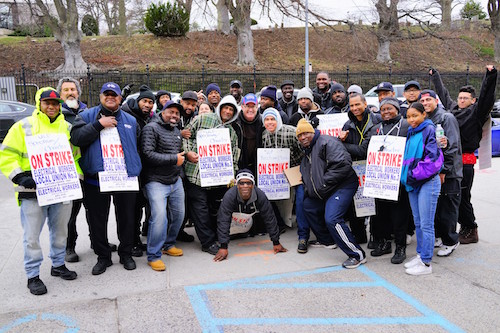New York Local 3 isn’t getting
anywhere with Charter/Spectrum officials in its battle for a fair contract for
striking workers.

|
| Some of the 1,800 members of New York Local 3 who are on strike against Charter/Spectrum. The strike is entering its third week and Charter officials are refusing to negotiate, even though the company’s CEO was the highest paid in America last year.
|
That caught the attention of leaders of the city’s five boroughs, who have taken issue with the company refusing to negotiate even while it is bringing in millions in profits. Meanwhile, its CEO’s salary has quadrupled, making him the highest paid CEO in America last year.
The nearly 1,800 Charter employees represented by Local 3 worked without a contract for nearly four years before going on strike March 28. In early April, New York City Public Advocate Letitia Adams wrote a letter to Charter CEO Tom Rutledge, saying the workers had “continued working in expectation that a contract would be negotiated by new management,” referring to Charter’s merger with longtime city cable provider Time Warner Cable in 2016.
The public advocate is the second-highest elected official in New York City. Adams’ letter was dated April 4 and co-signed by 33 members of the city council. Local 3 represents technicians, engineers and warehouse workers at Charter/Spectrum.
“Just as these workers stayed on the job in good faith, we are calling on Charter to come to the table in good faith to resolve this dispute and do what is right for its employees and its customers,” she wrote.
No talks have been held since the strike began and none are scheduled, Local 3 business representative Derek Jordan said.
“They haven’t moved off their initial proposals and haven’t shown they’re going to,” Jordan said.
Charter officials have emphasized they are offering workers a raise, but Local 3 officials said it won’t come close to offsetting proposed cuts in pensions, 401(k) plans, health benefits, paid holidays, accrued sick time and contributions to an educational trust fund that allowed employees and their spouses to attend college.
The company also would like to contract out some work done previously by Local 3 members. Charter has brought in replacement workers from around the country to fill in for the striking workers, which Local 3 believes is a violation of its franchise agreement with the city.
All that wasn’t lost on Adams.
“[Charter] is seeking to eliminate or diminish basic provisions of overtime, healthcare and retirement security,” she wrote. “Charter is not on the verge of bankruptcy or amidst any hardship that would justify such steep concessions of its working-class families. In fact, you have record profits.”
Support from public officials is always important, but even more so when a company refuses to negotiate, Jordan said. It lets customers know what Local 3 is asking for is reasonable, he said.
Three legislators from Queens – one a city council member, the other two members of New York’s General Assembly – followed up with their own letter to Charter officials late last week.
“We urge you to return to the bargaining table with a new approach, one that will lead to a speedy and fair resolution of the contract dispute,” they wrote. “You must protect the workers that make your company function and the New York consumers who rely on your service with as much fervor as you protect your bottom line.”
The company reported profits of $189 million in the third quarter of 2016, nearly triple the amount it reported during the same period of the previous year. Charter attributed that to closing on its purchase of Time Warner Cable and Bright House Networks, which makes Charter the second-largest cable provider in the country after Comcast.
Rutledge took advantage of a big grant of stock options to boost his pay to $98.5 million in 2016, the Wall Street Journal reported. His compensation had been $16.4 million in 2015.
Yet, despite those profits, the company has been slow to answer consumer complaints. New York Attorney General Eric Schneiderman sued Charter earlier this year over allegations it failed to meet pledges to update internet speeds.
That’s part of another issue in the dispute. Technicians for the company are routinely sent to a customer’s home with company officials knowing the equipment won’t fix the problem and promised internet speeds are unobtainable, Jordan said.
Those workers are disciplined when a company representative makes a return trip to the home. Charter has resisted proposals to change the policy even while knowing it is unfair to workers, he said.
“I hope this company and others see that we are strong – union strong,” Local 3 member and Charter employee Terrell Reyes told the New York Daily News.
“Yes, we have bills to pay, but more importantly, we have families that need healthcare, retirement that needs to be robust and morale that needs to be positive,” Reyes added. “We will continue to fight for what is right.”
Adams also noted that when the New York State Public Service Commission approved Charter’s purchase of Time Warner in 2016, it anticipated “significant investments” that would likely lead to an expansion in the company’s New York workforce.
“Surely the PSC did not contemplate Charter engaging in negotiations that seek to undermine the financial livelihood of New Yorkers,” she wrote.